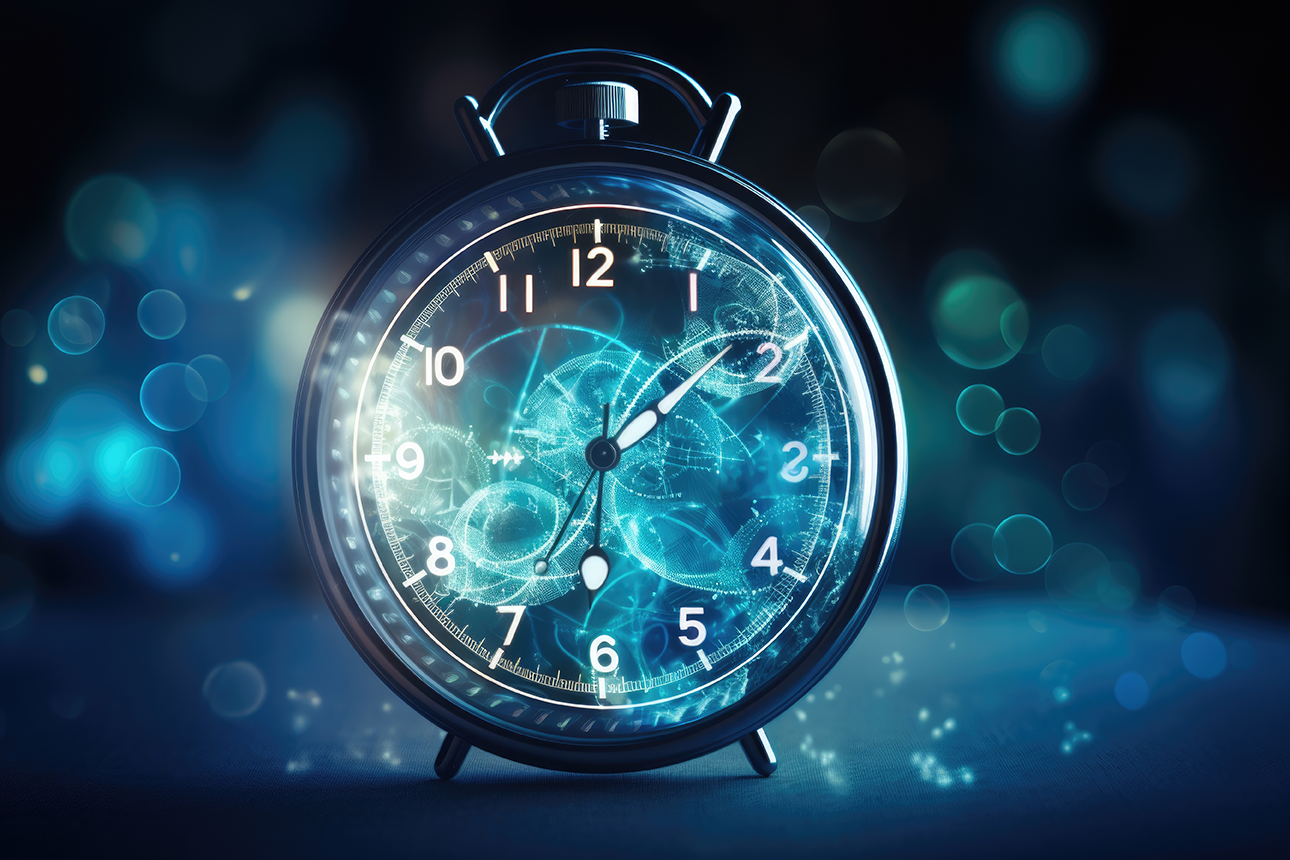As you lie in bed, surrounded by the comforting darkness, your body gradually heads off to sleep. But have you ever wondered what lies behind this nightly ritual? It’s all thanks to your circadian rhythms.
These 24-hour internal clocks govern a multitude of processes within your body, orchestrating your sleep-wake cycle, body temperature, and hormonal fluctuations. They operate in harmony with your biological clock, finely tuned within the deepest, most fundamental recesses of your brain.
But what exactly are these circadian rhythms and how do they play a pivotal role in helping you achieve restful sleep? Here we unravel the secrets of these rhythmical patterns and explore their impact on your overall well-being.
Definition and Importance
Circadian rhythms are crucial biological cycles that regulate essential functions and processes in your body, impacting everything from sleep and wakefulness to hormonal changes and immune system function. These rhythms are like the conductor of an orchestra, ensuring that all the different systems in your body play their parts in harmony. It’s like having a personal internal clock that keeps everything running smoothly.
Think of circadian rhythms as the ultimate timekeepers for your body, syncing up your body’s processes with the rising and setting of the sun. They help you know when it’s time to be alert and when it’s time to wind down for sleep. Without them, your body would be a chaotic mess.
But it’s not just about sleep and wakefulness. Circadian rhythms also have a hand in regulating your hormones. They make sure that your body releases the right hormones at the right time, keeping things like hunger, energy levels, and mood in check. So the next time you blame your insatiable late-night snack cravings on a lack of willpower, remember that your circadian rhythms might be the real culprit.
And let’s not forget about your immune system. Circadian rhythms play a crucial role in keeping your immune system strong and ready to fight off any pesky invaders. They help regulate the production of immune cells, ensuring that your body can mount an effective defense when needed.

BOOK A DISCOVERY SESSION
Mechanisms and Effects
As your body functions are synchronized with a biological clock in your brain, the mechanisms and effects of circadian rhythms optimize various biological processes at different times throughout the day. These rhythms exist in all types of organisms and help regulate a wide range of functions. They coordinate mental and physical systems, ensuring that everything runs smoothly.
At the core of circadian rhythms is the suprachiasmatic nucleus (SCN) in your brain, which acts as the master clock. It receives input from light, the most powerful external cue that influences these rhythms. Light exposure during the day promotes alertness, while darkness at night triggers the production of melatonin, a hormone that helps you sleep.
Maintaining a regular sleep-wake schedule and getting exposure to natural light during the day minimizing light exposure in the evening can help support a healthy circadian rhythm and promote better sleep and overall health.
Circadian rhythms also affect other bodily functions, such as appetite and body temperature. For example, your body temperature tends to be highest in the afternoon and drops during the night, preparing you for sleep. Similarly, your appetite follows a daily rhythm, with hunger peaking in the late afternoon and decreasing at night.
A synchronized circadian rhythm promotes restorative sleep and increased daytime activity. When your circadian rhythm is aligned with the natural day-night cycle, you feel more energized during the day and sleepy at night. However, disruptions to circadian rhythms, such as jet lag or shift work, can lead to sleep disturbances and insomnia.
In addition to sleep, circadian rhythms play a crucial role in overall health. They influence the immune system, mental health, and even DNA repair processes that prevent cancer development. Disruptions in circadian rhythms can weaken the immune response, contribute to mood disorders like depression, and increase the risk of developing certain types of cancer.
Circadian Rhythm and Sleep
When your circadian rhythm is synchronized, you experience restorative sleep and increased daytime activity. But disruptions to your circadian rhythm can lead to sleep disturbances and insomnia. For example, traveling across multiple time zones can cause jet lag, leaving you feeling irritable, sleepy during the day, and unable to sleep at night. Night shifts or rotating work schedules (Shift work sleep disorder) can also disrupt your sleep-wake cycle, making it difficult to establish a consistent sleep pattern.
Specific circadian rhythm sleep disorders, such as delayed sleep phase disorder (DSP), advanced sleep phase disorder (ASP), and irregular sleep-wake rhythm, can further disrupt your sleep schedule. DSP causes difficulty falling asleep at a normal time, while ASP causes excessive sleepiness in the early afternoon and a tendency to go to bed and wake up much earlier than usual. Irregular sleep-wake rhythm leads to irregular sleep patterns, with bedtimes occurring at various times in a 24-hour period.
Circadian Rhythm and Health
Maintaining a synchronized circadian rhythm is crucial for promoting overall health and well-being. Your circadian rhythms play a significant role in your physical and mental health, influencing various bodily functions and systems. When your circadian rhythms are disrupted, it can lead to sleep problems and affect your immune system, mood stability, and even increase the risk of developing mental health disorders.
Your circadian rhythms have a profound influence on your immune system. Disruptions to your circadian rhythms can weaken your immune response, making you more susceptible to illnesses and infections. By maintaining a healthy circadian rhythm, you’re also supporting your body’s natural defenses against diseases.
Factors That Disrupt Circadian Rhythm
Factors that can disrupt circadian rhythms include travel across multiple time zones, night shift work, certain sleep disorders, and underlying issues, genetics, and behavioral factors. Some factors can include:
Travel across multiple time zones
The dreaded jet lag. You hop on a plane, cross several time zones, and suddenly your body has no idea what time it is. Your circadian rhythm gets thrown out of whack, leaving you feeling groggy, irritable, and downright exhausted. It’s like your body is saying, ‘Wait, we’re supposed to be eating dinner right now, not breakfast!’
Night shift work
Working the night shift is like playing a game of hide-and-seek with your circadian rhythm. Instead of being snug in bed when the sun goes down, you’re wide awake, trying to stay alert while everyone else is catching some Z’s. Your body’s internal clock gets thrown off balance, leading to sleep disturbances and a constant battle with fatigue.
Certain sleep disorders
This is possibly the most brutal factor of all. Imagine having a sleep disorder that messes with your circadian rhythm through no fault of your own. Conditions like advanced sleep phase disorder and delayed sleep-wake phase syndrome can leave you feeling like a sleepy time traveler. You struggle to fall asleep at a normal time or find yourself wide awake when you should be snoozing away. It’s like your body is playing a cruel joke on you. No matter what you do, no caffeine, dark curtains, adjust the bed, but your body chemistry blocks it all like NBA basketball star Hakeem Olajuwon guarding the net (Olajuwon retired from basketball in 2002 with a record setting 3,830 blocks, but that’s another story).
“Digital Jet Lag” or “Social Jet Lag”
Dr. Satchin Panda is a professor at the Salk Institute, La Jolla, California, where his research focuses on the circadian regulation of behavior, physiology and metabolism. He is an expert on Circadian rhythms and says it is much more than just shift work and jet lag. Some other causes of circadian rhythm disruption according to Dr. Panda include:
- Shift-work-like lifestyle: This includes high school and college students, musicians, performing artists, new mothers, in-home caregivers, and spouses of shift workers.
- Jobs in the gig economy: This includes part-time drivers for ride-share services and food delivery services, flexible workers, and freelancers.
- Jet lag: This occurs when you travel across two or more time zones within a day. Nearly 8 million air travelers take to the air each day, and half of them travel over at least two time zones.
- Social jet lag: This occurs when someone sleeps late and wakes up at least 2 hours later on the weekends. More than 50 percent of the population in modern society experiences social jet lag.
- Digital jet lag: This happens when you chat with friends or colleagues that are several time zones away over social networks or digital devices and as a result have to stay awake for more than 3 hours between 10:00 p.m. and 5:00 a.m.
Seasonal circadian disruption: Millions of people living in extreme north and south latitudes
Causes of Circadian Rhythm Sleep Disorders
Causes of circadian rhythm sleep disorders can vary, but they often stem from disruptions to the body’s internal clock. So, what exactly can mess with your body’s natural sleep-wake cycle?
Well, first, there’s genetics. Some people may inherit genes that make their circadian rhythms a little wonky. Thanks, Mom and Dad!
Aging can also throw a wrench in the works, as the circadian system tends to become less robust as we get older.
But it’s not just our genes and the passing of time that can mess with our sleep. Conflicts with time demands can wreak havoc on our circadian rhythms. Whether it’s school, work, or that overzealous social calendar, trying to fit everything in can throw your body for a loop. And let’s not forget about those night owls and early birds among us. If your natural sleep tendencies clash with your daily obligations, you’re bound to experience some circadian rhythm disruptions.
A naturopathic approach prioritizes holistic interventions to address the root cause of circadian rhythm disruptions. By understanding the intricate dance between your internal clock and external factors, you can optimize your sleep-wake cycle and reap the benefits of a healthy rhythm for your overall well-being.
Frequently Asked Questions
How Do Circadian Rhythms Affect Mood and Mental Health?
Circadian rhythms have a big impact on your mood and mental health. When your circadian rhythms are disrupted, it can mess with your sleep and wake cycles, which can lead to mood instability and contribute to mental health disorders like depression and bipolar disorder.
Your biological clock and circadian rhythms also play a role in your immune system and DNA repair processes, so disruptions can weaken your immune response and increase the risk of cancer.
Can Disruptions in Circadian Rhythms Affect Appetite and Weight Regulation?
Disruptions in circadian rhythms can definitely mess with your appetite and weight regulation. When your natural body clock is thrown off, it can lead to irregular eating patterns and cravings for unhealthy foods.
Plus, sleep deprivation from circadian rhythm disturbances can mess with your hormones, making you hungrier and more prone to overeating.
Are There Any Natural Remedies or Lifestyle Changes That Can Help Regulate Circadian Rhythms?
To regulate your circadian rhythms and improve your sleep, there are natural remedies and lifestyle changes you can try.
- Establish a consistent sleep schedule by going to bed and waking up at the same time every day.
- Expose yourself to natural light during the day and limit exposure to bright lights at night.
- Avoid caffeine and heavy meals close to bedtime.
- Create a relaxing bedtime routine and ensure your sleep environment is comfortable and conducive to rest.
Can Circadian Rhythm Disruptions Impact Fertility and Reproductive Health?
Circadian rhythm disruptions can indeed impact fertility and reproductive health. When your circadian rhythms are disrupted, it can affect hormone regulation, including the hormones responsible for reproductive processes. This can lead to irregular menstrual cycles, decreased fertility, and even difficulties in maintaining a healthy pregnancy.
Are There Any Long-Term Health Consequences of Chronic Circadian Rhythm Disruptions?
Chronic disruptions to your circadian rhythms can have long-term health consequences. Research suggests that these disruptions can increase the risk of developing various health issues, including cardiovascular disease, obesity, diabetes, and even certain types of cancer.
When your circadian rhythms are out of sync, it can lead to sleep disturbances, reduced immune function, mood disorders, and hormonal imbalances.
Harmony in Rhythm: Nurturing Your Circadian Cycles for Optimal Sleep and Well-being
Understanding circadian rhythms is crucial for maintaining a healthy sleep-wake cycle and overall well-being. These 24-hour cycles regulate essential functions in our bodies, including our sleep patterns, body temperature, and hormonal changes.
Disruptions to these rhythms, such as jet lag or shift work, can lead to sleep disturbances and impact our physical and mental health. By recognizing the importance of circadian rhythms and taking steps to maintain their balance, we can ensure better sleep and improved overall health. If you experience sleep disruption for more than four months you should speak with one of our sleep experts.


